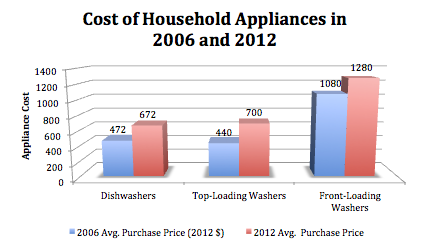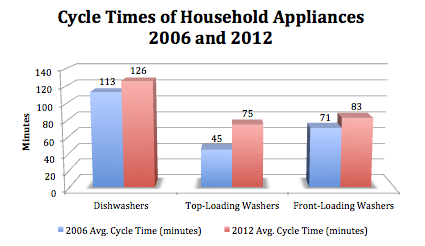By Institute for Energy Research ——Bio and Archives--November 27, 2013
Global Warming-Energy-Environment | CFP Comments | Reader Friendly | Subscribe | Email Us
 ***Front-Loading averages based on top 10 models reviewed in each year. Of note, 2006 overall ratings were significantly lower than 2012. Source: Consumerreports.org
FIGURE 2
***Front-Loading averages based on top 10 models reviewed in each year. Of note, 2006 overall ratings were significantly lower than 2012. Source: Consumerreports.org
FIGURE 2
 Source: Consumerreports.org
Conclusion
Americans are intimately aware of the costs of their utility bills and are always looking for ways to balance the convenience of their appliances with energy savings. Americans are also acutely aware of their precious time. When federal regulators step in and mandate energy efficiency improvements, the mandate increases the price of appliances and makes the appliances less time efficient. Federal bureaucrats have no business making this tradeoff for Americans.
There are real concerns that the overall costs of energy efficiency mandates outweigh the benefits. Appliances are now more expensive and occupy more valuable time in the lives of Americans. There is no need for lawmakers and bureaucrats to step in and artificially limit our choices, especially to implement regulations on appliances with costs that will take nearly two decades to recoup. To borrow a phrase from President Obama, if you like your dishwasher, you should be able to keep your dishwasher. Period.
IER Policy Associate Landon Stevens authored this post
(i) Consumer Reports, Washers & Dryers: Savings at a Price, Mar. 2006 p. 44.
[ii] Consumer Reports Annual Buying Guide, Jan. 1, 2008,
[iii] www.consumerreports.org
[iv] ibid.
[v] In 2009, Consumer Reports noted online in subscriber only section of their website that “Each improvement in energy-efficiency scores, from good to very good, for instance, cuts an average of $10 to $20 from your annual energy expenditures.” The 2012 washing machines are rated at “Very Good” for energy efficiency at $700 and “Excellent” for the $1000 model, while the 2006 washer was rated as “Good” on energy efficiency.
[vi] Consumer Reports, Washers & Dryers: Savings at a Price, Mar. 2006 p. 44.
[vii] consumerreports.org
[viii] PowerSource, April 2013. Tri-County Electric Co-Op
[ix] Consumer Reports, Dishwashers: Tougher Take on Grime; Feb 2006. Pg. 40-43.
[x] Consumer Reports, Dishwashers Ratings and Reliability
[xi] Per Capita Personal Income by State.
Source: Consumerreports.org
Conclusion
Americans are intimately aware of the costs of their utility bills and are always looking for ways to balance the convenience of their appliances with energy savings. Americans are also acutely aware of their precious time. When federal regulators step in and mandate energy efficiency improvements, the mandate increases the price of appliances and makes the appliances less time efficient. Federal bureaucrats have no business making this tradeoff for Americans.
There are real concerns that the overall costs of energy efficiency mandates outweigh the benefits. Appliances are now more expensive and occupy more valuable time in the lives of Americans. There is no need for lawmakers and bureaucrats to step in and artificially limit our choices, especially to implement regulations on appliances with costs that will take nearly two decades to recoup. To borrow a phrase from President Obama, if you like your dishwasher, you should be able to keep your dishwasher. Period.
IER Policy Associate Landon Stevens authored this post
(i) Consumer Reports, Washers & Dryers: Savings at a Price, Mar. 2006 p. 44.
[ii] Consumer Reports Annual Buying Guide, Jan. 1, 2008,
[iii] www.consumerreports.org
[iv] ibid.
[v] In 2009, Consumer Reports noted online in subscriber only section of their website that “Each improvement in energy-efficiency scores, from good to very good, for instance, cuts an average of $10 to $20 from your annual energy expenditures.” The 2012 washing machines are rated at “Very Good” for energy efficiency at $700 and “Excellent” for the $1000 model, while the 2006 washer was rated as “Good” on energy efficiency.
[vi] Consumer Reports, Washers & Dryers: Savings at a Price, Mar. 2006 p. 44.
[vii] consumerreports.org
[viii] PowerSource, April 2013. Tri-County Electric Co-Op
[ix] Consumer Reports, Dishwashers: Tougher Take on Grime; Feb 2006. Pg. 40-43.
[x] Consumer Reports, Dishwashers Ratings and Reliability
[xi] Per Capita Personal Income by State.View Comments
The Institute for Energy Research (IER) is a not-for-profit organization that conducts intensive research and analysis on the functions, operations, and government regulation of global energy markets. IER maintains that freely-functioning energy markets provide the most efficient and effective solutions to today’s global energy and environmental challenges and, as such, are critical to the well-being of individuals and society.